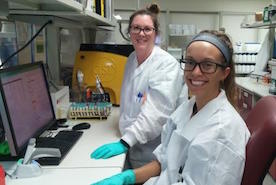 Medical Laboratory Science Profession
Medical Laboratory Science Profession
A Medical Laboratory Scientist (MLS) (also referred to as a Medical Technologist) is a healthcare professional who works in the following areas of the clinical laboratory: chemistry, immunology, hematology, hemostasis, urinalysis, microbiology, molecular diagnostics and immunohematology (blood banking or transfusion services). They perform a wide variety of testing, from simple pregnancy tests to highly sophisticated instruments for diseases like HIV/AIDS, diabetes and cancer.
Medical laboratory scientists are knowledgeable in the use of a wide variety of specialized analytic equipment and understand the pathophysiology of abnormal test results. They are responsible for ensuring the accuracy and reliability of test results, and reporting their findings to patient care providers in a timely manner. Laboratory results help care providers confirm or rule out diagnoses, monitor chronic disease changes and assess the effects of medical therapies.
Medical laboratory scientists possess a bachelor’s degree in either medical/clinical laboratory science or basic science (e.g., biology, chemistry) and complete their education in an accredited education program (university or hospital-based) which provides clinical course work in all areas of laboratory medicine. Graduates are eligible to sit for the MLS Board of Certification (BOC) examination offered by the American Society for Clinical Pathology (ASCP). Those that successfully pass the exam can use the credential MLS (ASCP).
Employment Opportunities
Opportunities for jobs are excellent. Employment of medical laboratory scientists (MLS) and technicians (MLT; two year associate degree laboratory professionals) is projected to grow 5% from 2022-2032, much faster than the average for all occupations, according to the Bureau of Labor Statistics.
Career prospects include clinical hospital laboratories, reference laboratories, public health laboratories, research and development laboratories, laboratories in physician offices or in veterinary medicine, forensic science, genetics, biotechnology laboratories, pharmaceutical laboratories or sales, business and education.
Additional information about Medical Laboratory Science
- A Life Saved: Laboratory Professionals Make a Difference – a poignant video that highlights the role laboratory professionals play in patient care; an American Society for Clinical Laboratory Science (ASCLS) video.
- Denver Health Laboratory Professionals – meet some of the Denver Health laboratory staff as they discuss ways they have improved processes to better patient care.
- The Hidden Profession That Saves Lives – read about one person’s career path that led to medical laboratory science; published by Elsevier.
- Consider Medical Laboratory Science as a Career – a short video in which laboratory professionals answer the question “What do you love about your career?;" an American Society for Clinical Laboratory Science (ASCLS) video.
- Laboratory Science Careers - informational website about medical laboratory science careers


